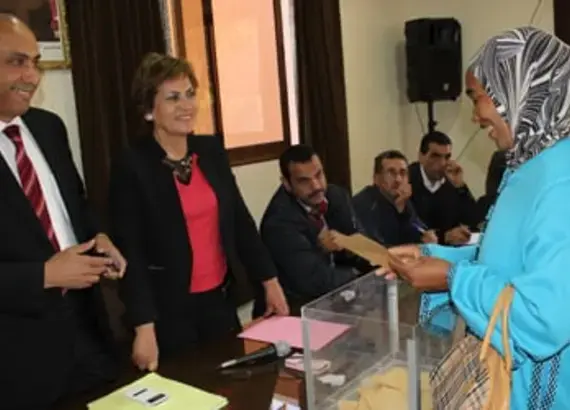
Success Story
Constituency Outreach in Morocco Bridges Gap between Citizens and Elected Officials
Under a dusty sky in Marrakech, 80 families looked on as construction vehicles demolished the shanty town they once called home. The families, who had long struggled on the margins of this vibrant city, greeted the demolition not with fear but with hope. They knew that, once the rubble had cleared, in its place would rise new and affordable homes for their families thanks to the vigorous advocacy efforts of their member of parliament (MP), Milouda Hazib.
Hazib heard about the families’ struggle to find decent and stable housing through her newly- established local constituency outreach office, which she and her staff use to meet with citizens and learn what’s on their minds. Local offices of this kind, and constituent outreach generally, are rare in Moroccan politics because of the limited resources of parliament and political parties, along with citizens’ widespread unfamiliarity with the role of MPs in representing their interests. Hazib’s assistant, Mounir Aznai, said the Marrakech office has “contributed directly to building a real, participatory relationship between citizens and MPs via dialogue and outreach.”
Hazib’s office, along with 13 others across the country, was made possible through an NDI program funded by the United Kingdom’s Foreign and Commonwealth Office. Two MPs each from seven leading parties in parliament now have offices in their home districts. Before they opened, NDI convened the participating MPs to discuss how constituency outreach plays a key role in the legislative process by helping them understand citizens’ priorities and ground policy development in local realities. NDI worked with the MPs on how to engage citizens using techniques like town hall meetings and surveys. The Institute also trained assistants to help manage the new offices, organize local outreach events and handle constituent cases.
Since the offices opened in January, they have received more than 10,000 visitors and taken on 4,600 cases, more than a third of which have been resolved. These cases range from addressing everyday annoyances, such as removing feral dogs in Casa Ain Chock, to the deadly serious. In Temara, a community just south of Rabat, a man burst into the office of MP Adil Tchikitto reporting that his young son, who struggles with mental disability, had been thrown in jail for attempting to burn down a local mosque. Tchikitto immediately called the Minister of Health to intervene, and the boy was successfully transferred to an appropriate mental health facility to receive care.
Episodes like this have become regular occurrences since the offices opened and underscore the positive impact MPs can have on constituents’ lives. Furthermore, the local offices have enabled participating MPs to deepen their knowledge of local priorities and better appreciate the importance of addressing them in parliament. Since January, participating MPs have held 472 local events to engage citizens and raised 277 questions in parliament related to the concerns expressed by citizens during these events.
Now, participating MPs are asking parliamentary leaders to provide regular funding for constituency outreach so that all of Morocco’s 395 MPs in the House of Representatives can improve their engagement with constituents and build much-needed trust.
Published Nov. 5, 2014
